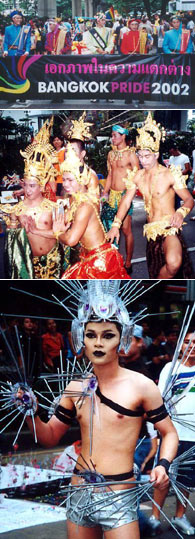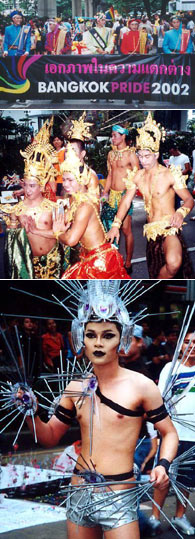Thailand has been known for years as a decadent gay paradise and there's a very visible scene from the pole twirling go-go boys of Patpong and Surawong to the Britney/Whitney mimicking cabaret kathoeys (ladyboys) looking to lure unsuspecting Western tourists. Though behind the neon-lit fa�ades and the sex tourist Mecca stereotypes there's not only prejudice, which foreign visitors are often blind too, more importantly there's an increasingly visible and vocal gay middle-class confident in its sexuality and catered to by a growing number of Continental-style cafes and bars. "I think the younger Thais are far more gay identified," says Australian academic Peter Jackson, who's studied Thailand's gay subculture for many years.

As recently as the early 1980s there was no real 'scene' as such and a lot of gay men didn't identify as homosexual, were married and paid money boys to sate their desires. Thankfully, the commercial explosion of gay venues led by those such as Telephone Pub, which opened in 1987, has seen an attendant change in attitudes. Lesbians have also become more of a visible presence thanks to campaigning community groups like Anjaree (see www.anjaree.com) and it's now a common sight to see the check-shirted tom (tom-boys) walking hand in hand with their glamorous dees (ladies) and hanging out in edgy venues like Vega.
There's an up and coming 'so fashionable it hurts' gay scene too based around Chatuchak Market with bars like ICQ and Echo drawing a bright, young Thai crowd with not a foreign sex tourist in sight. "I don't mind people knowing I'm gay, it's just the way I am," says Tong, one of ICQ's local weekend revelers and the view is seemingly echoed by his group of partying teenaged friends.
Discos like Sake and TG Street in the Banglamphu district also cater almost exclusively to a young, Thai and gay crowd and are a world away from Silom's money boy scene. Carefree local youths swing from the rafters nightly fuelled by a potent mix of Thai whisky and hormones dancing to a bewildering selection of home-produced pop and Western high-energy dance music.
Though there is prejudice, as indicative of the recent draconian government 'social order campaign' sometimes specifically targeted at gays - men-only saunas have been raided, gay nightclubs temporarily closed and go-go boys told to cover up. "There are strong anti-gay sentiments in society as a whole. It's physically safe and you don't get arrested but Thais can read subtle disapproval, like a stare that says 'tut' [faggot]," says Jackson.
Nevertheless the new generation of gays, in a society that's far from demonstrative, are much more confident than their predecessors in a way unthinkable 20 years ago and even Jackson concedes: "Societal tolerance is slowly turning to acceptance."
Gays have become so visible in fact that the Bangkok Gay Festival (BGF) was inaugurated in 1999, which culminated in a street parade through the centre of the city. Three years down the line and in the face of the government crackdown, the BGF's pioneering founder Pakorn Pimton says: "Gay people are just normal people. We want to be treated like everyone else."
The oppressive government has only served, therefore, to politicise the gay community. There's certainly a need to redress the balance and in 2001 the BGF was joined by the Bangkok Pride Coalition (BPC) - an influential group of gay businessmen, academics and volunteer groups - to host Gay Pride, which was bigger and better than the previous two events and included a party in Lumphini Park.

The recently held 2002 festival was bigger still and showed how far Bangkok's gay community has come. This year's week-long event, which included a film festival, community awards ceremony and art show, culminating in a parade through the city centre actually received hard won government approval, the backing of the Tourism Authority of Thailand and major corporate sponsorship from Mazda Cars. Official sources estimate that 100,000 people came to attend the parade making for one of the city's biggest and most colourful parties in recent years.
"The government have given us their full support this time and we have told them it [Pride] will be a tradition on a yearly basis in the third week of November. The Tourism Authority of Thailand are also part of the project," says Anan Anpruang, co-chairman of Pride. "The difference from previous years is that everyone is now working together as a group."
However financial aid from official quarters hasn't been forthcoming, which is unfortunate considering the tourist dollars events of this size can generate. Though the whole set-up is a lot more professional, while in previous years people never seemed to know whether the event was actually happening till the last minute due to haphazard planning and battles with various authorities over permission, Bangkok Pride is a professional organisation as underlined by a successful year-long promotional campaign along with the backing of the Prime Minister's Office.
But while it's clear such festivals can generate a lot of revenue for the country and a lot of fun; can Pride really change attitudes? Pakorn, the pioneer of gay rights in Thailand, sees an uphill struggle and says: "There is discrimination [against gays] everywhere."
Characteristically, Anan is more optimistic stating his long-term aim for Pride which is to "reduce prejudice and close the gap," even though he admits: "We're taking a step-by-step, tactical approach. We're not asking for any rights yet, we just want to be seen in a positive light."
Though with its numerous bars, gay-friendly restaurants and cafes and saunas outnumbering Sydney, there's the inescapable feeling that Bangkok has stepped fabulously out of the closet.
